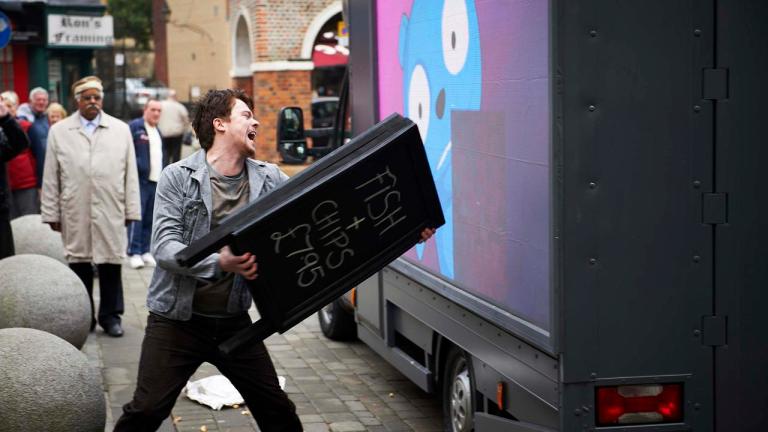Black Mirror: The Unexpected Foresight of The Waldo Moment
Political satire The Waldo Moment from Black Mirror's second series deserves re-evaluation in light of real-world current events...

If you’re looking to inspire debate among fans of Black Mirror, Charlie Brooker’s despairing Twilight Zone for the technological age, start with the simplest question of all: ask which of the show’s 13 episodes to date are “the best.” Everyone has their set of favorites. Episodes range from 44 minutes to 89, take place in past, present, and future, and differ wildly in tone, style ,and ideas. Like a tainted chocolate box, Black Mirror presents different flavors for different pop culture palettes.
For horror buffs there’s “Playtest”; for black comedy aficionados there’s “The National Anthem” and “Nosedive”; for downright sadists who like their dystopias both blood-curdling and familiar, there’s “White Bear” and “Shut Up and Dance.” For romantics, there’s “Be Right Back” and “San Junipero.” For those who like their seasonal sci-fi specials bleak with extra Hamm, there’s the feature-length “White Christmas.” There is no “best” Black Mirror, because each episode was made for someone. Each has its champions.
All, apparently, except one curiously unloved hour of the show. Episode three of Black Mirror’s second series drew lukewarm to negative reviews on its first airing, in sharp contrast to the more positive reception welcomed by its predecessors. Even now, with its premise appearing more horribly prescient than even Brooker ever imagined it would be, “The Waldo Moment” remains the disregarded runt of the Black Mirror litter. You’ll find no critical ranking of episodes the same, but they almost without exception share one thing in common: “The Waldo Moment” always comes in dead last.
Brooker himself has admitted he thinks it was the one episode of Black Mirror he “didn’t nail.” This tale, about a foul-mouthed cartoon bear (played behind-the-scenes in motion capture by Daniel Rigby’s depressed comedian) making a surprisingly successful run for Parliament in a local by-election, was dismissed at the time as broad and half-baked. Here at Den of Geek, “The Waldo Moment” was considered a “lesser episode.”
Brooker has agreed with the critics. He admits it’s the one he wishes he could do all over again. Perhaps the episode should have instead been developed into a miniseries, as Brooker now believes, thus offering us insight into how “Waldo” went from a candidate in a British by-election to the apparent all-seeing future dictator seen in the episode’s coda. The portrayal of Waldo, too, is still problematic: is this Ali G-style creation really as amusing as the characters on the show think he is? Because Waldo doesn’t quite work, the episode still isn’t successful as a comedy, but nor should “The Waldo Moment” be funny now regardless. Now, what was deemed one of the “sillier” hours of Black Mirror looks decidedly, and terrifyingly, recognizable.
The episode’s concept seemed simply ridiculous back in 2013, when global politics were markedly more stable and there was but a whiff of neo-fascism in the air. One of the main contemporary criticisms of the show was that Waldo’s rise didn’t seem believable. The A.V. Club wrote that “There’s just not enough there to suggest that Waldo’s moment would last much longer than 15 minutes.” As it became clear late on the night of November 8th that Donald Trump was to become the next President of the United States, the official Black Mirror Twitter account tweeted: “This isn’t an episode. This isn’t marketing. This is reality.” Amazingly, “The Waldo Moment” had suddenly become the Black Mirror episode closest to our own reality.
Other episodes of Black Mirror have been spookily specific in their accurate predictions of the future. “The National Anthem,” in which the Prime Minister of Great Britain copulates with a pig on live television, predated David Cameron’s own similar swine-related scandal. “Be Right Back,” in which Hayley Atwell’s widow purchases a robot copy of her dead husband to help her cope with the loss, correctly foretold of companies like ETER9 replicating the presence of the deceased using AI. These are small-fry, however, in comparison to what “The Waldo Moment” saw coming: the global rise of far-right populism, and the electorate being hijacked by troll-voters, mischievously laughing their way into a dystopia.
The episode predicted that insidious rightwingers would hide behind buffoonish, boisterous masks to appeal to voters and thus gain political power. It predicted how growing distrust in politicians and an increasingly pervasive celebrity culture would create a perfect storm, in which we’d come to view celebrities with no political experience as more trustworthy to hold office than real politicians.
Fortune smiled upon “The Waldo Moment” in a cosmically ironic way. The world had to get worse for it to get better. It was the Black Mirror everyone used to dismiss, but now, in the age of Trump, it actually looks like the most astute of the lot. Though in one key way, fantasy and reality did diverge.
Americans elected Donald Trump as their president, but in “The Waldo Moment” the Trump-like central figure actually loses to a Conservative rival by a small margin. Brooker couldn’t envision a world in which voters elected a brash TV personality into office – at least not right away. The final scene of the episode jumps ahead to a nightmare scenario, in which the electorate has miraculously gifted sweeping powers to the protest candidate.
Brooker skips the part explaining how Waldo went from losing a by-election to becoming the despotic head of a fascist surveillance state – perhaps because he thought such a sequence would appear far-fetched. None of it looks far-fetched now.